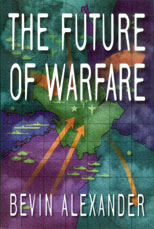 Click here to purchase from Barnes & Noble.
Click here to purchase from Amazon.com.
Click here to purchase from Barnes & Noble.
Click here to purchase from Amazon.com.
The United States Will Not Create an Empire
Excerpt from The Future of Warfare, by Bevin Alexander, pages 22-23
During the Cold War, Americans saw their strategy as protecting all nations against domination by a world power. To some degree, the U.S. still perceives itself as continuing to guard the free world. But today the line between free and unfree has been blurred, and the line between rich and poor has more validity. Other nations may now dispute an American role as protector. The U.S. may keep new Soviet Unions from arising, and stop Saddam Husseins from seizing the world's oil, but who will keep the United States from exploiting or perhaps conquering them? With no Soviet Union threatening, other powers may regard U.S. control of the seas as a device to advance American interests. They certainly viewed Britain in this light when it ruled the waves, and with justification, because Britain used its invincible navy and its less-powerful army to advance its own economic and political interests.
The United States may exploit its superpower position, but it cannot conquer the world. Like Britain of yore, it lacks one essential element: manpower, and, most significantly, the willingness to expend it in conquest. It cannot master Eurasia by force, because American manpower is far too small to mount the kinds of military operations necessary to subdue it or even to establish springboards there. Two wars on the supercontinent in the past forty-five years, in Korea and Vietnam, have demonstrated this fact. Conflicts with great land powers---since they can't be resolved quickly---tend to become wars of attrition with high casualties. Nations with great manpower reserves can tolerate such losses far better than the United States, which has always abhorred large numbers of killed and wounded. Therefore, the U.S. must couple its relatively small army with the manpower of allies to keep a balance of power.
<< More 'Terror & Future Wars' Excerpts << Back to top